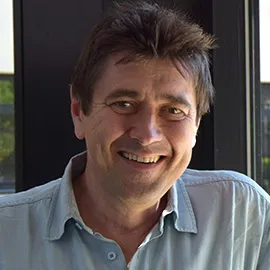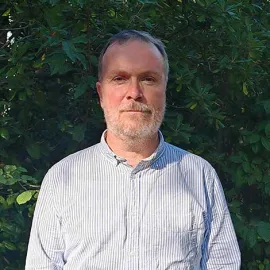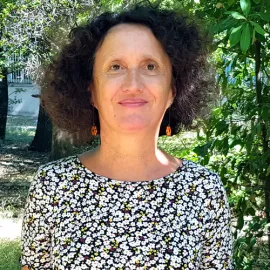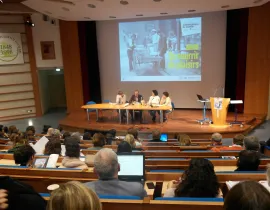Working towards more sustainable food systems
|
What type of training ? |
une formation diplômante, sous statut étudiant |
|---|---|
|
For who ? |
student with a French diploma, international student |
|
Where ? |
Centre for Tropical and Mediterranean Studies |
Objective
Developing sustainable food systems and ensuring global food security are crucial challenges that must be addressed in coming decades by a wide range of public and private actors in the North and South. These systems must guarantee that all people have access to an adequate amount of quality food and remain healthy. The systems also must minimize their ecological footprint, reduce waste, ensure fair wages within sectors and generate jobs.
Graduates will be equipped to contribute to the efforts required to strengthen the sustainability of food systems in France, Europe and abroad, and will be able to:
- understand the issues at stake in the sustainability of contemporary food systems
- propose and use sustainability assessment tools
- analyse organizational and/or technical innovations and policies that can help build more sustainable food systems
- support these innovations and policies
Themes
- agrifood, food science, nutrition, process engineering
- markets, sectors and agricultural and agrifood companies
- agricultural and environmental policies
-
Programme
Number of ECTS credits : 75 ECTS
Language of instruction : In French
The course is organized in three parts
The first seeks to understand the evolution of food systems, take stock of the current situation and analyze the issues at stake (UE 1 & 2):
- Understanding family farming through a systemic approach
- Agriculture and food, sustainability in question
- International organizations and negotiations on agriculture and the environment
- Retrospective and prospective analysis of national governance of food systems
The second is dedicated to acquiring tools to assess different impact categories and intervention tools (UE 3):
- Tools to evaluate the sustainable development of food systems
- Assessment of the environmental footprint of food systems
- Supporting innovations in food systems
The final part enables an exploration of innovation frontiers in different fields (UE 4):
- Re-territorialisation of agriculture and food
- Innovations for food and nutrition security
- Standardization of food systems, expectations and consumer practices
- Urban planning, sustainable food and health
- Lobbying and advocacy
During the year, students also must carry out a study of an innovation, one that is technical or organizational, and analyze its impact and change of scale capacity (UE 5).
Internship (compulsory)
Students undertake a professional assignment between May and October. This may focus on one of the following themes:
- strengthening the sustainability of a production, a local or national development process…
- sector development (chain of stakeholders, strategies and coordination, distribution of value added, strengthening cooperation between stakeholders within a sector…),
- development of producers’ organization/coordination, capacity-building for collective action (collective mark, collective response to a demand…),
- determining factors behind the development and endurance of an innovation network
- market study (evolution of food behaviour, ethical consumption…)
- development of innovative resource management systems
- development of sustainability indicators
-
Calendar
Applications are reviewed by the admissions committee, which determines the list of candidates finally selected. Two admissions commissions are organized each year. Candidates who wish to seek funding from third parties must present their applications to the first commission.
- 1st admission commission:
Submission deadline: March, 12 2025 - 2nd admission commission:
Submission deadline: May, 14 2025
Courses begin: mid-September
- 1st admission commission:
-
Admissions
To be accepted into this course, you must hold a Bachelor degree and proof of 2 years of postgraduate study such as a master’s degree or equivalent or 1 year of post-graduate study, with at least 3 years of professional experience in the field of life, human or social sciences.
Under a derogation process, some applicants with a Bachelor degree and three years of experience at least or with a Bachelor and 1 year of post graduate study can also be admitted
Certain modules in the training program also can be taken through lifelong learning programs.
For international candidates
If you have a Campus France office in your country and you wish to apply, you must contact Campus France in your country to prepare your application.
You can obtain information about Campus France and the countries covered by the CEF procedure.
-
Careers
Actors engaged in improving the performance of a company, a producers’ organization, a territory, an agricultural or food sector at the national level… must increasingly balance economic imperatives against other objectives related to sustainable development. These trends require various food system actors to develop new skills within their teams.
Graduates develop strategic expertise and prospective analysis capacities that they can offer to many public and private employers: companies, consulting firms, associations, NGOs, local public authorities, government agencies, international organizations… Graduates also can help create or develop start-ups and social enterprises.
Director of studies
-
-

Nicolas BRICAS
UNESCO Chair on World Food Systems head
- Chaire UNESCO « Alimentations du monde »
Email : nicolas.bricas@cirad.fr
Website :
Chaire UNESCO Alimentations du Monde
Partners
- Training program jointly developed and coordinated with CIRAD
- UNESCO Chair on World Food Systems labelled program
- UMR MOISA
- UMR Innovation
With the support of
Place
Pôle Tropiques et Méditerranée
Campus de Lavalette
1101, avenue Agropolis
Montpellier
Registration
Key features
- Training program jointly developed and coordinated with CIRAD
- Conférence des Grandes Ecoles (CGE) label
- Diverse lecturers enabling the constitution of a solid professional network
- Teaching based largely on discussions, roundtables, debates…
- Numerous group and individual assignments: case studies, role playing, field surveys…
- Organization of a professional event (Innovations for Sustainable Food Systems Day)
- Production of a short film
- Release of a student’s individual work in published proceedings
- Individual advisor for career development
- Classes consisting of participants from varied professional and educational backgrounds
Fees
€7,500
+ €105 Contribution Vie Etudiante et de Campus (CVEC) administrative fee
Funding
International Candidates
- Scholarship Programs Eligible: This program qualifies for the World Bank scholarship programs (JJWBGSP) and the EIFFEL Scholarship.
Attention: To apply for the World Bank scholarship, applications must be submitted on their website between January and February.
To apply for the EIFFEL scholarship, applications must be submitted to our services in early December.
Please contact us as soon as possible if you intend to apply for any of these scholarships (verify your eligibility beforehand).
- French Embassies Abroad Scholarships (SCAC Scholarships): These scholarships can also fund the Specialized Master's® IPAD. The candidate should contact the French Embassy in their country for information on eligibility conditions and procedures.
- Other Independent Funding Sources: Scholarships from Ministries of Higher Education in home countries, assistance from banks (such as the Inter-American Bank or BID), companies, and associations from home countries.
Candidates Returning to Studies and Registered with Pôle Emploi (French Employment Agency)
- Referenced Training on Carif-Oref Catalog ("Training in the Region")
- Supported Training by the Occitanie Region in 2018-2019 - Forpro Sup Program
Eligibility conditions: Being out of the education system for a minimum of 2 years and being registered with Pôle Emploi.
Attention: The number of individuals who can benefit from this program is limited. You can contact us for more information. Personalized administrative support requires prior admission to the Specialized Master's® IPAD.
For your information, unemployment benefits (ARE) can be maintained during training (check your eligibility with Pôle Emploi). The application for unemployment benefits in training (AREF) must be made to Pôle Emploi, in connection with the personalized project for access to employment (PPAE) developed with Pôle Emploi.
- Individual Training Assistance (AIF): A financial aid covering the training fees.
Eligibility criteria: Registration with Pôle Emploi.
- The Youth Employment Mission (Mission locale) can contribute to the financing of training fees.
Eligibility criteria: Registration with Pôle Emploi.
French and International Candidates
- Foundations Provide Study Funding: Maurice Ferrier Foundation, DFCG Foundation, Jacques Lambert Foundation under the aegis of the Foundation of France, etc.
The procedures are independent of our services.
- Financial Support from the Employer:
If the training is related to the current position, the employer may grant financial assistance. Contact your employer to discuss this possibility.
- Apply for Financial Assistance for Training Fees:
A commission for scholarships (for a reduction in all or part of the training fees, excluding health insurance) for the Specialized Master's® IPAD is organized after the 2nd admission committee.
Applicants admitted in the 1st and 2nd committees who wish to apply will receive a specific dossier. The number of possible beneficiaries is limited. The budget available for this financial aid comes from the support of the UNESCO Chair on World Food Systems.
Contacts
-
Programme coordinator
Mastère Spécialisé® Innovations et politiques pour une alimentation durable

Mastère Spécialisé IPAD
Programme coordinator
Mastère Spécialisé® Innovations et politiques pour une alimentation durable
- Centre for Tropical and Mediterranean Studies
Email : ipad@supagro.fr
L'Institut Agro Montpellier
2 place Pierre Viala
34060 Montpellier - France
Tél. : +33 (0)4 99 61 22 00 Tél. : +33 (0)4 99 61 22 00
Fax : +33 (0)4 99 61 29 00
contact@supagro.fr


























